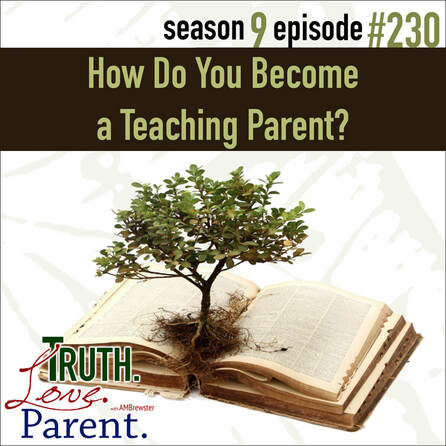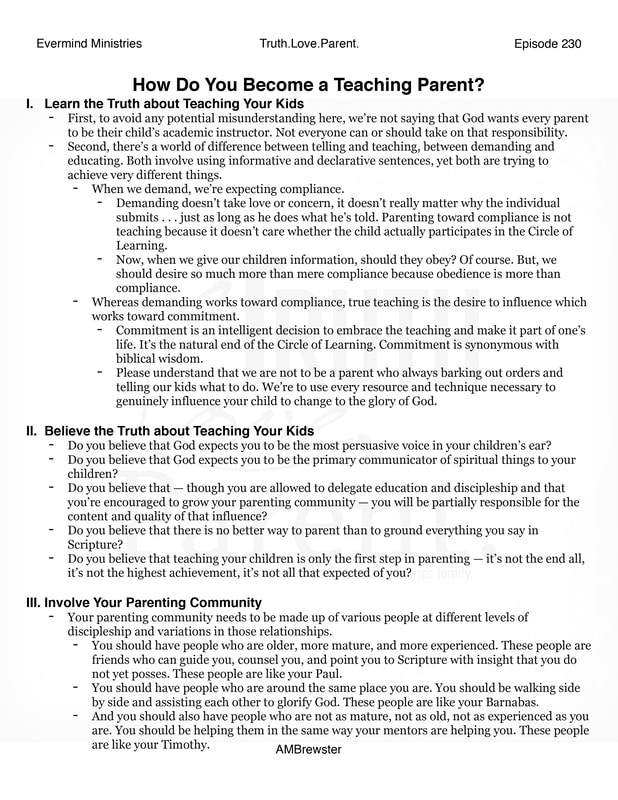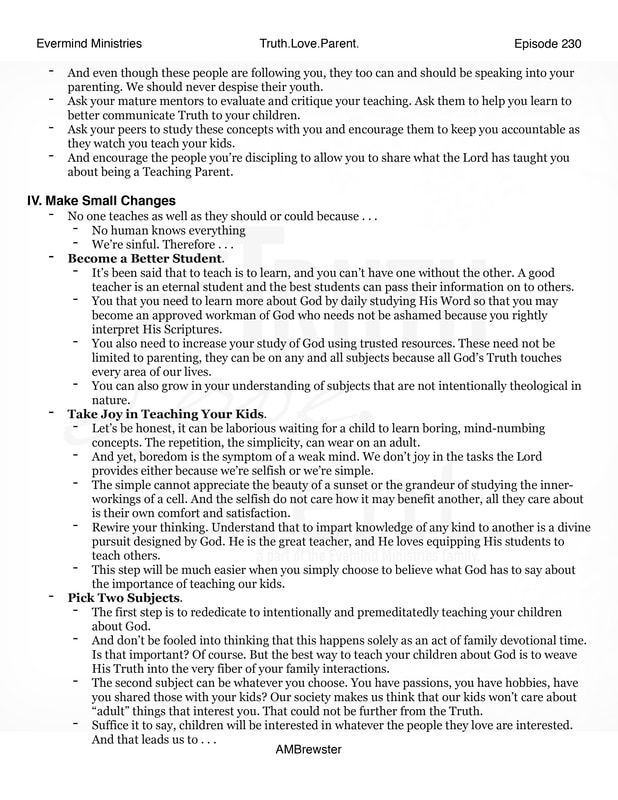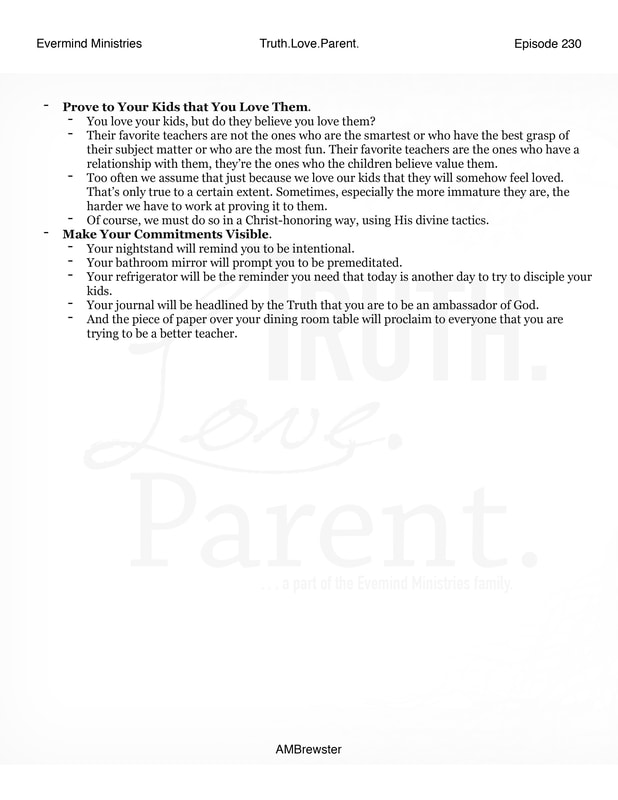 What does God want you to teach your kids? What’s the difference between telling and teaching? Join AMBrewster as he teaches Christian parents to teach their kids the things of God. Check out 5 Ways to Support TLP. Listen to the following episodes on Apple podcasts by clicking the titles. “Prepare Your Kids. Don’t Protect Them” (episode 12) “What's the Parent’s Role in their Children’s Education?” (episode 79) “Repetitive Parenting | how to enjoy repeating yourself” (episode 150) “A Parent’s 5 Jobs, Part 2 | Educator” (episode 185) “Concrete Family Talk” (episode 156) “Teach Your Children to . . . .” (multiple series) “Teach Your Children to Learn” series (episode 207) “Teach Your Children to Obey” series (episode 138) “Merest Christianity” series (starts in episode 95) "The Most Important Thing I Can Say to Parents” (episode 17) Click here for our free Parenting Course! Like us on Facebook. Follow us on Twitter. Follow AMBrewster on Twitter. Follow us on Pinterest. Subscribe on YouTube. Need some help? Write to us at [email protected]. Click "Read More" for today’s Episode Notes and Transcript. Episode NotesTo download this document, please right-click and select "Save Image As." TranscriptIntroductionWelcome back, friends! I have so enjoyed working through this series with you. To be honest, I never really know what a series will fully involve and include until I’m in the middle of it, and never once have I regretted a series or wished it were over. And — as far as this series goes — I’ve been learning so much, and I pray you have too. And if this is your first time with us, let me give you a tour. My name is Aaron, my wife is Johanna, and we have two biological children named Micah and Ivy. But we also have 8 surrogate teenage, at-risk boys who live with our family at Victory Academy for Boys. I’ve been counseling families for over a decade, and this show is a distillation of the process. Of course, it also includes a ton of new things with which I'd never really grappled before because I’m still in process to becoming a good parent . . . just like you are. So, if you’re new, I welcome you and encourage you to subscribe to this show so you don’t miss any. You can also enjoy the previous 229 episodes we’ve already published which cover so many different parenting topics, I’d be remiss to even start trying to explain them all here. But I do cite numerous episodes per show and link them in the description so you can fill out your understanding of the day’s topic. And you can always go to our website, TruthLoveParent.com to download our free episode notes and read transcripts from our show. Also, I think I should quickly introduce you to Matt and Sonja. They, along with an anonymous donor, are to thank for today’s episode. They’re Patrons of the show, and since we’re a listener supported ministry creating free content for parents all over the world, their sacrificial gifts make what we’re doing possible. If you’re looking for a Christ-honoring, Bible-based, family-invested ministry in which to invest this year, I encourage you to learn a little more about us by perusing our website and clicking on the 5 Ways to Support TLP” link in the description of today’s episode. Today we’re continuing our series entitled “How Do You Become?” It’s all about how to take the first steps to being a newer and better and more Christ-honoring version of ourselves this year — specifically as it affects our parenting. So, welcome to this journey with us. TopicWe’ve been following a very strict format for these episodes. First, we do a fly over of what we need to know in order to be the parent God called and created us to be. Second, we challenge ourselves to truly believe what God has said is true. Third, we’ve been learning how to get our parenting community involved in this new change. And fourth we’ve been outlining the practical, first steps we need to take in order to change our parenting trajectory. My only regret is that we haven’t been opening the Scripture as much during these episodes. Normally, we spend the bulk of our time reading and applying the Bible to our parenting. But these episodes are designed to be the application side of that. Most of the biblical ideas we’re going to cover today have already been taught on previous episodes. In fact, in just a couple minutes I’m going to give you a list 6 series and episodes that have already dug into God’s Word to help us learn how to be Teaching Parents. That’s where you’ll find the Scriptures opened and consumed. But these episodes want to answer the practical “Now what?” question. Now that I know some of what the Bible stays about teaching my kids, how do I actually make that change? Of course, each episode is filled with practical, relevant, application, but this series is about the first steps. So, here goes. 1. We need to learn the Truth about teaching our kids. Like I just said, we have many episodes about this, and they’ll all be linked in the description. Episode 12 helps us understand the difference between preparing our kids and protecting them. Episode 79 asks what expectations God has for us when it comes to our kids’ education. Episode 150 is about how we can learn to enjoy repeating ourselves all of the time. Because, you know, every parent has to do that. Episode 185 details the role of the Teacher Parent in the “Parent’s 5 Jobs” series. Episode 156 discusses Concrete Family Talk which is super important to teaching well. We also have a bunch of other episodes about Christ-honoring communication within the home including “How to Rightly Debate Your Child,” the “War of Words,” “Is Family Joking Okay?” “Is It Okay to Get Mad?” “The Communication House,” and more. And then we have a whole collection of series called “Teach Your Children to.” We have “Teach Your Children to Obey,” “Teach Your Children to Love,” “Teach Your Children to Avoid Waste,” “Teach Your Children about True Friendship,” and many, many more. And each of them is firmly rooted in God’s Word. So, please check those out. We can’t believe what we don’t know. We can’t become what we haven’t learned. If you don’t understand what God wants when He expects us to teach our children, or you misunderstand what He meant, then you can’t take the steps necessary to be that Teaching Parent. And, to avoid any potential misunderstanding here, let me clarify that I’m not saying that God wants every parent to be their child’s academic instructor. My wife and I homeschool our children, but we acknowledge that not everyone can or should take on that responsibility. Also, I want to add something new here. There is a world of difference between telling and teaching, between demanding and educating. Both involve using informative and declarative sentences, yet both are trying to achieve very different things. When we demand, we’re expecting compliance. Demanding doesn’t take love or concern, it doesn’t really matter why the individual submits . . . just as long as he does what he’s told. Parenting toward compliance is not teaching because it doesn’t care whether the child actually participates in the Circle of Learning. If you don’t know what that is, you really should listen to the “Teach Your Children to Learn” which starts in episode 207. Now, when we give our children information, should they obey? Of course. But, we should desire so much more than mere compliance because obedience is more than compliance. You can learn more about that in our “Teach Your Children to Obey” series. Whereas demanding works toward compliance, true teaching is the desire to influence which works toward commitment. Commitment is an intelligent decision to embrace the teaching and make it part of one’s life. It’s the natural end of the Circle of Learning. Commitment is synonymous with biblical wisdom. Please understand that this episode is not encouraging you to be a parent who’s always telling your kids what to do. I’m encouraging you to use every resource and technique necessary to genuinely influence your child to change to the glory of God. So, again, if you don’t understand what God expects from Teaching Parents, we’re going to do something wrong. Alright, it you’re ready to move on for now, then . . . 2. We need to believe the Truth about teaching our Kids. There’s something very different between knowing something and believing something. Our “Merest Christianity” series is all about discovering the seminal nature of faith and understanding how it differs from desire or knowledge. So, you may know a ton about the responsibility parents have to teach their children, but do you really believe it? How will you know if you believe it? Well, belief always results in action. If you’re teaching your children the things of God in the ways He prescribes, then you believe it. But if your parenting doesn’t resemble God’s expectation, then you really don’t believe it’s important to do as He says. So, do you believe that God expects you to be the most persuasive voice in your children’s ear? Do you believe that God expects you to be the primary communicator of spiritual things to your children? Do you believe that — though you are allowed to delegate education and discipleship and that you’re encouraged to grow your parenting community — you will be partially responsible for the content and quality of that influence? Do you believe that there is no better way to parent than to ground everything you say in Scripture? Do you believe that teaching your children is only the first step in parenting — it’s not the end all, it’s not the highest achievement, it’s not all that expected of you? If you don’t believe any of these, then you’re never really going to be the Educator Parent God designed you to be. You won’t seek to do more than teach your children unless you understand how desperately they need interpretation, counsel, and training and believe that God has called you provide that for them. Believe these truths, my friends, so that you can start becoming them. 3. Get your parenting community to help as you grow in your teaching abilities. Your parenting community needs to be made up of various people at different levels of discipleship and variations in those relationships. You should have people who are older, more mature, and more experienced. These people are friends who can guide you, counsel you, and point you to Scripture with insight that you do not yet posses. These people are like your Paul. You should have people who are around the same place you are. You should be walking side by side and assisting each other to glorify God. These people are like your Barnabas. And you should also have people who are not as mature, not as old, not as experienced as you are. You should be helping them in the same way your mentors are helping you. These people are like your Timothy. And even though these people are following you, they too can and should be speaking into your parenting. We should never despise their youth. Ask your mature mentors to evaluate and critique your teaching. Ask them to help you learn to better communicate Truth to your children. Ask your peers to study these concepts with you and encourage them to keep you accountable as they watch you teach your kids. And encourage the people you’re discipling to allow you to share what the Lord has taught you about being a Teaching Parent. Wouldn’t it be great if, at the end of the year, everyone in your parenting circle was better at teaching their children the awesome Truths of God? And 4. Make small changes. No one teaches as well as they should or could because . . .
Based off these two observations, you can start becoming a better Teaching Parent by continuing your own education. I’m not talking about going back to school or taking online classes, though that’s totally an option. I provide some additional guidance on this point in episode 17, "The Most Important Thing I Can Say to Parents.” But I am telling you that you need to learn more about God by daily studying His Word so that you may become an approved workman of God who needs not be ashamed because you rightly interpret His Scriptures. You also need to increase your study of God using trusted resources. These need not be limited to parenting, they can be on any and all subjects because all God’s Truth touches every area of our lives. We’re growing our collection of trusted resources at TruthLoveParent.com and encourage you to check those out when we’re done here. And you can also grow in your understanding of subjects that are not intentionally theological in nature. Our family loves learning new things together. When Micah became interested in chess, the whole family learned the game. When Ivy took up textiles, we all learned to knit and crochet and sew. When Johanna developed a passion for painting, we all learned to create art. And when I started beekeeping, the whole family got stung. Just kidding . . . they all learned to care for bees. Last year I learned to really enjoy spinach, I developed an appreciation for new games, I learned more about health and wellness, I was taught about tending an apple orchard, I studied all the subjects I teach my children as part of their education, I continued improving in my piano, I gleaned a ton of new information about creation as my wife and I dipped into horticulture, and I explored a bunch of other interesting pastimes. It’s fun, and the more I learn the more I can pass onto my kids. But the second reason we don’t teach as well as we could or should is that we’re sinful. This causes us to be lazy, arrogant, and dismissive. But, the good news is that if we’re pushing ourselves to learn more about God and His Word, we’re going to grow in our sanctification as well. So, that’s the first small change we can make. In order to become a good teacher we must . . . 1. Become a better student. It’s been said that to teach is to learn, and you can’t have one without the other. A good teacher is an eternal student and the best students can pass their information on to others. 2. Take joy in teaching your kids. Let’s be honest, it can be laborious waiting for a child to learn boring, mind-numbing concepts. The repetition, the simplicity, can wear on an adult. And yet, as I tell my students, boredom is the symptom of a weak mind. We don’t joy in the tasks the Lord provides either because we’re selfish or we’re simple. The simple cannot appreciate the beauty of a sunset or the grandeur of studying the inner-workings of a cell. And the selfish do not care how it may benefit another, all they care about is their own comfort and satisfaction. Rewire your thinking. Understand that to impart knowledge of any kind to another is a divine pursuit designed by God. He is the great teacher, and He loves equipping His students to teach others. This step will be much easier when you simply choose to believe what God has to say about the importance of teaching our kids. 3. Pick two subjects. The first step is to rededicate to intentionally and premeditatedly teaching your children about God. And don’t be fooled into thinking that this happens solely as an act of family devotional time. Is that important? Of course. But the best way to teach your children about God is to weave His Truth into the very fiber of your family interactions. Take the instruction we’ve provided on our previous shows to guide your children into the light while you sit on their beds at night, as you discuss the books they’ve been reading, as you watch movies, as you talk about the difficulties at school, and as you enjoy vacation together. That’s the first subject you should resolve to teach your kids. The second subject can be whatever you choose. You have passions, you have hobbies, have you shared those with your kids? Our society makes us think that our kids won’t care about “adult” things that interest you. That could not be further from the Truth. I plan to do an episode about children’s toys, how they shape our children’s thinking, and how they mold who they will become. Suffice it to say, children will be interested in whatever the people they love are interested. And that leads us to . . . 4. Prove to your kids that you love them. I know you love your kids, but do they believe that? Their favorite teachers are not the ones who are the smartest or who have the best grasp of their subject matter or who are the most fun. Their favorite teachers are the ones who have a relationship with them, they’re the ones who the children believe value them. Too often we assume that just because we love our kids that they will somehow feel loved. That’s only true to a certain extent. Sometimes, especially the more immature they are, the harder we have to work at proving it to them. Of course, we must do so in a Christ-honoring way, using His divine tactics. If you have not listened to our “Four Family Loves” series, I suggest you do so in order to better understand God’s definition of love and how He designed it to be shown. So, in order to become a better Teaching Parent in the new year . . .
That’s right. Your walls are going to be covered with all of your goals, resolutions, and determinations. Your nightstand will remind you to be intentional. Your bathroom mirror will prompt you to be premeditated. Your refrigerator will be the reminder you need that today is another day to try to disciple your kids. Your journal will be headlined by the Truth that you are to be an ambassador of God, and the piece of paper over your dining room table will proclaim to everyone that you are trying to be a better teacher. ConclusionNow, remember. These are first steps. These aren’t all the answers. There’s so much more that could be said, and — Lord willing — more time to say those things in the future.
For now, understand that true Ambassador Parents are going to want to teach their children how God’s Word applies to every facet of their lives. Please share this episode with your friends, and join us next time as we ask the question “How Do You Become an Interpreting Parent?” I love you guys, and I’m honored to spend this time with you every week. Please know that the spiritual health and wellness of your family is our highest concern. So, to that end, I’ll see you next time.
0 Comments
Leave a Reply. |
Receive UpdatesJoin The TLP Family and receive email updates when we publish new articles and episodes.
Subscribe to Our PodcastCategories
All
Archives
July 2024
|
Truth.Love.Family.
- Truth.Love.Family.
- Donate
-
Podcast
-
Special Guests
>
- Ryan & Kim Ahrens
- Scott & Becky Aniol
- George Barna
- Dave Bender
- Alan Benson
- Carolyn Brewster
- Tim Challies
- Natasha Crain
- Kristen Clark
- Hillary Morgan Ferrer
- Todd Friel
- Ken Ham
- Jay Holland
- Kristen Jenson
- Chris Kaspar
- Becky Keife
- Heath Lambert
- Jessica Mair
- Dr. Joe Martin
- Mark Massey
- Katie Miller
- Jim Newheiser
- Steve Pettit
- Shannon Popkin
- Aaron & Elaina Sharp
- Mark Shaw
- Lynna Sutherland
- Nathan & Anna Sutherland
- Brandon Talley
- Arthur C. Woods
- Episodes by Series
- Episodes by Topic
- Where to Listen
-
Special Guests
>
- Community
-
Resources
- Counseling
- Speaking
- The Celebration of God
- AMBrewster.com
- Evermind Store
|
To submit general questions or ideas for future episodes: [email protected]
To request specific assistance for your family: [email protected] |
We are a participant in the Amazon Services LLC Associates Program. As an Amazon Associate, we earn from qualifying purchases. Click any Amazon link at TruthLoveParent.com, shop as usual, and TLP will receive commissions off all of your sales! Click here to learn more.
Site powered by Weebly.











 RSS Feed
RSS Feed
